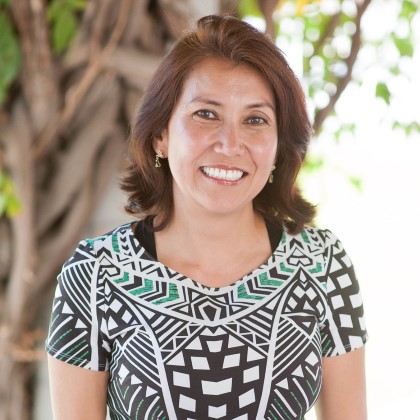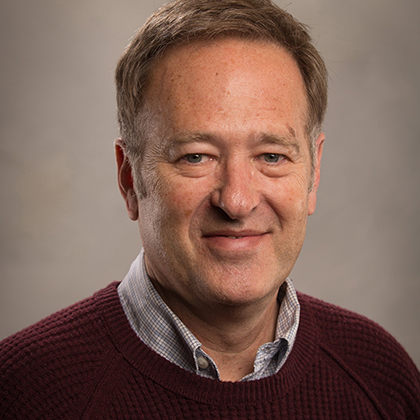Learning From Exemplary K-12 Teachers Through Video Lesson Demonstrations, Video Conferencing, and Collaborative Simulations
Professional Bios: Nirmla Flores and Greg Hamilton

Dr. Nirmla Flores is a Visiting Lecturer for the School of Education, University of Redlands. Since 2008, she has worn different hats for the School of Education (U of R)—serving as Adjunct Instructor, Faculty Liaison, Cohort Advisor, Doctoral Advisor, and University Supervisor. Currently, she teaches education preparation courses for the teacher candidates, ranging from Language and Literacy, Teaching Seminar, Research in Practice, as well as Fieldwork Clinic/Teacher Performance Assessment courses. She has been awarded various research grants that pertain to student invention, technology implementation, multidisciplinary faculty seminar, and community service learning. Recently, she co-authored and co-edited a book called "Who We Are and How We Learn: Educational Engagement and Justice for Diverse Learners". Her current research work focuses on preparing teacher candidates on how to deal with the challenges faced in a diverse classroom setting as well as demystifying the myths of bilingual education.
Recently, she was involved (and continues to be involved) in co-leading/co-organizing a Teacher Summit Conference called Better Together as well as a variety of open forums sponsored by the Center for Educational Justice (U of R). She is also a regular conference research presenter at CABE, NABE, and CCTE, Additionally, she is an active member of Temecula Valley Unified School District's English Learner Advisory Committee where she is keenly engaged in roundtable conversations that seek to challenge all forms of marginalization as well as to generate a range of useful solutions and immediate plan of action.
 Greg Hamilton completed his Bachelor of Arts degree at Lewis & Clark College, master’s degree in English Education at Columbia University. During his eighteen years as a classroom teacher and teacher educator in New York City, Greg taught all subject areas in grades 5 – 8 and worked with professors and community leaders to support the development of research-based reading and writing programs for grades 9 – 12 at The Beacon School, Heritage High School, and Baruch College Campus High School. While in New York, Greg was Adjunct Professor for The New School for Social Research, co-coordinator of student teaching placements and Assistant Professor in the English Education program at Columbia University. Greg has spent his past seven years lecturing in the School of Education at the University of California, Davis, leading workshops for Bay Area teachers through the Bay Area Writing Project at University of California, Berkeley, and supporting K – 12 literacy instruction and assessment protocols for suburban and rural public school programs. Greg recently moved his family to the greater Los Angeles area where he taught 6th grade math and science at the New Los Angeles Charter School before accepting a Clinical Faculty position at the University of Redlands’ School of Education.
Greg Hamilton completed his Bachelor of Arts degree at Lewis & Clark College, master’s degree in English Education at Columbia University. During his eighteen years as a classroom teacher and teacher educator in New York City, Greg taught all subject areas in grades 5 – 8 and worked with professors and community leaders to support the development of research-based reading and writing programs for grades 9 – 12 at The Beacon School, Heritage High School, and Baruch College Campus High School. While in New York, Greg was Adjunct Professor for The New School for Social Research, co-coordinator of student teaching placements and Assistant Professor in the English Education program at Columbia University. Greg has spent his past seven years lecturing in the School of Education at the University of California, Davis, leading workshops for Bay Area teachers through the Bay Area Writing Project at University of California, Berkeley, and supporting K – 12 literacy instruction and assessment protocols for suburban and rural public school programs. Greg recently moved his family to the greater Los Angeles area where he taught 6th grade math and science at the New Los Angeles Charter School before accepting a Clinical Faculty position at the University of Redlands’ School of Education.
Project Summary:
Using technology will engage teacher candidates in the learning process. Their use of technology allows them to become active participants instead of passive listeners and creates opportunities to take ownership of their own work. As teacher candidates become more active in their own learning, problem solving strategies used to address the needs of K-12 students are more likely to be authentic and timely. Needless to say, technology integration has absolutely supported student involvement and engagement in the classrooms (Longman, 2013). Empowerment: Using technology transforms the role of the university course instructor from an authority-expert to a facilitator as teacher candidates are guided to observe, reflect, practice problem solving techniques and interact and converse with K-12 exemplary teachers online. Teacher candidates are transformed from passive recipients to active participants alongside university course instructors and K-12 exemplary teachers sharing and co-constructing knowledge of problem solving strategies and best practices together. University course instructors will also benefit from learning new technology programs along with teacher candidates. “Consequently, improved teacher technology skill levels will likely strengthen technology integration within classrooms and contribute to an empowered 21st century workforce” (Pickett, 2009, p.137). Differentiation: Technology provides opportunities for differentiation for teacher candidates. Computers targeted at multimedia applications showing pictures, sounds, and videos are able to meet the needs of the learning styles of various learners. Teacher candidates engaging in “live” question and answer sessions with exemplary teachers may serve as pre and post assessment opportunity for course instructors to better meet the needs of individual teacher candidates. According to a mixed-methods research study done by Ruggiero and Mong (2015), teachers with strongly student-centered practices tended to exhibit a more pronounced need to create learning opportunities with technology as a base for enhancing 21st century skills in students. Transparency: Teacher candidates engaging in live conversations with K-12 exemplary teachers are able to make their thinking processes more transparent to the master teachers as well as the university course instructors. Problem solving strategies can be examined in “real time” as teacher candidates consider the issues at hand in the classrooms where they are student teaching. In a study done by Menard (2010), it was found that teachers’ perceptions are important in changing pedagogy toward constructivism where both students and teacher can collaborate in designing, developing, and implementing their learning experiences. The major recurring themes of this study supported by a constructivist culture were: collaborative and independent, receptive to individuals and valued their relationships, interconnected with integrated technology, safe and nonjudgmental, vision driven, to name a few. Cooperative Grouping and Collaboration: Teacher candidates have individual and unique pedagogical needs based on the nature of the subject areas they are learning about. Technology allows teacher candidates to form small working groups according to subject area focus. Technology allows for K-12 exemplary teachers to address specific subject area questions with teacher candidates across multiple university classroom sites. The research concluded that the classroom instruction and learning were enriched through the integration of technology in support of the curriculum. Hence, archiving the library of videos for this project which can be accessible to all SOE instructors throughout the academic year would be highly beneficial in establishing and maintaining support for ALL teacher candidates.


 Greg Hamilton completed his Bachelor of Arts degree at Lewis & Clark College, master’s degree in English Education at Columbia University. During his eighteen years as a classroom teacher and teacher educator in New York City, Greg taught all subject areas in grades 5 – 8 and worked with professors and community leaders to support the development of research-based reading and writing programs for grades 9 – 12 at The Beacon School, Heritage High School, and Baruch College Campus High School. While in New York, Greg was Adjunct Professor for The New School for Social Research, co-coordinator of student teaching placements and Assistant Professor in the English Education program at Columbia University. Greg has spent his past seven years lecturing in the School of Education at the University of California, Davis, leading workshops for Bay Area teachers through the Bay Area Writing Project at University of California, Berkeley, and supporting K – 12 literacy instruction and assessment protocols for suburban and rural public school programs. Greg recently moved his family to the greater Los Angeles area where he taught 6th grade math and science at the New Los Angeles Charter School before accepting a Clinical Faculty position at the University of Redlands’ School of Education.
Greg Hamilton completed his Bachelor of Arts degree at Lewis & Clark College, master’s degree in English Education at Columbia University. During his eighteen years as a classroom teacher and teacher educator in New York City, Greg taught all subject areas in grades 5 – 8 and worked with professors and community leaders to support the development of research-based reading and writing programs for grades 9 – 12 at The Beacon School, Heritage High School, and Baruch College Campus High School. While in New York, Greg was Adjunct Professor for The New School for Social Research, co-coordinator of student teaching placements and Assistant Professor in the English Education program at Columbia University. Greg has spent his past seven years lecturing in the School of Education at the University of California, Davis, leading workshops for Bay Area teachers through the Bay Area Writing Project at University of California, Berkeley, and supporting K – 12 literacy instruction and assessment protocols for suburban and rural public school programs. Greg recently moved his family to the greater Los Angeles area where he taught 6th grade math and science at the New Los Angeles Charter School before accepting a Clinical Faculty position at the University of Redlands’ School of Education.